Your browsing is private, so you can't be easily tracked online
What is a VPN? 2025 Guide

If your device is connected to the internet, your internet service provider can see everything you do. Every search. Every file you download. Everything. To protect their privacy, more people are using virtual private networks, or VPN for short, to stop companies from tracking what they do online.
To help put an end to the misinformation surrounding VPN, we'll explain what a VPN is, how it works, why you need one, and what a VPN can do for you.
What is a VPN?
A VPN is an app that keeps your internet connection private, whether you're connecting to unsafe public Wi-Fi or your network at home. Having a layer of security that blocks people from watching you browse helps keep you safe online, no matter where you connect from.
Virtual private networks protect you by creating an encrypted "tunnel" that all of your device's data travels through on its way to the internet. Encryption turns words and data, like text files, into a secret code. If someone tries to read encrypted data without the password, they'll see random gibberish.
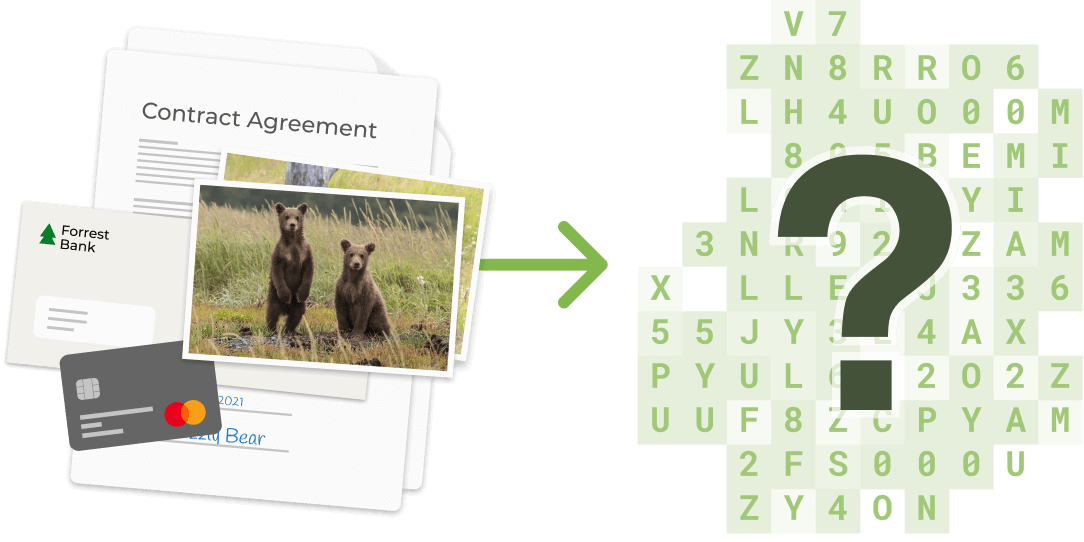
TunnelBear makes your data unreadable between you and its destination
A VPN acts as your gateway for accessing the internet privately. VPN software can be installed on most popular devices, like your phone, laptop and desktop. One important thing to remember is a VPN provider isn't the same as an internet service provider. You'll still need an ISP to connect to the internet, your VPN runs on top of that connection.
When you connect to a VPN


Your connection looks like it's coming from another country, which unblocks some websites

Your internet connection is encrypted, keeping the information you send and receive private
Why do I need a VPN?
The reasons why you need a VPN are personal, and a little different for everyone. Some people use VPN to bypass app restrictions and stay in touch with loved ones while traveling in heavily censored countries. Other people use VPN to stay secure on public Wi-Fi. Some people, just like knowing their internet service provider can't see what they're browsing every time they go online.
While the benefits of using VPN are just starting to go mainstream, it wasn't long ago that people had trouble seeing the importance of antivirus. As hacking and viruses became regular news stories, people realized how dangerous just browsing a website could be. Loss of privacy has become the new "virus," and while most devices have some type of virus protection, very few have any kind of privacy protection.
Just like you need protection from viruses, you need to protect yourself from privacy threats. Using a VPN wraps your browsing in a layer of encryption, making it harder for people to spy on you online.
Ready to start using a VPN? Get TunnelBear today!
Top reasons people use VPN
Block online tracking
Advertisers invade your online privacy by targeting your IP for ads. By changing your IP address, TunnelBear blocks common ways advertising trackers follow you around the internet.

Stay safe on public WiFi
People love public Wi-Fi, but so do hackers. With simple tools, they can capture passwords and logins as they pass through a shared Wi-Fi point. Keep your accounts safe by encrypting your connection with TunnelBear.

Stay connected to home
Don't miss out on current events or local news when you're travelling. With servers in , TunnelBear can help you stay connected to home as if you were there.

Stream video faster
Internet service providers regularly throttle services they compete with, but with TunnelBear, you can avoid throttling by keeping your browsing private from your service provider.

Bypass censorship
More governments are trying to censor news and communications outside their borders. TunnelBear can help bypass censorship by connecting to a server in another country, so you can get the information you need.

Travel securely
Don't trust the Wi-Fi in your hotel? TunnelBear's Grizzly-grade encryption lets you safely check your email, bank account, book flights and more—all without risking your personal information.

Protect your online privacy
Most websites ignore your Human Right to privacy. Whether it's your internet service provider monitoring your connection or advertisers tracking you, exercising your right to privacy is becoming more difficult. With TunnelBear VPN, all of your browsing is encrypted so no one else can see what you're doing.

Peer-To-Peer
Internet service providers regularly slow, and even block, torrent connections on their networks. TunnelBear protects you from disconnects and blocks ISP from seeing your traffic, so they can't slow it down.
What does a VPN do and how does it work?
Security
A VPN encrypts your connection and protects your personal data from being intercepted and read by attackers. Typical things attackers try to steal are passwords, credit card information, and private messages.
Privacy
Using a VPN adds a layer of privacy to your online life. A VPN prevents your ISP, employer, or network owner from logging all the sites you visit, and stops websites from following your IP address around the internet.
Access
VPN provide access to an open and unrestricted internet. By connecting to servers in other countries, VPN help you bypass government censorship bans on news sites, social networks, games, or other websites you love.
VPN work by creating a secure tunnel that protects your device's connection to the internet. That protection is a layer of encryption, or coded language, only your VPN app and the server understand. With an encrypted connection, no one can monitor your online activity. If someone tried to track what you were doing, they would only see a random series of numbers and letters.
With TunnelBear
Your data is protected inside an encrypted tunnel from ISPs, network owners, and hackers.
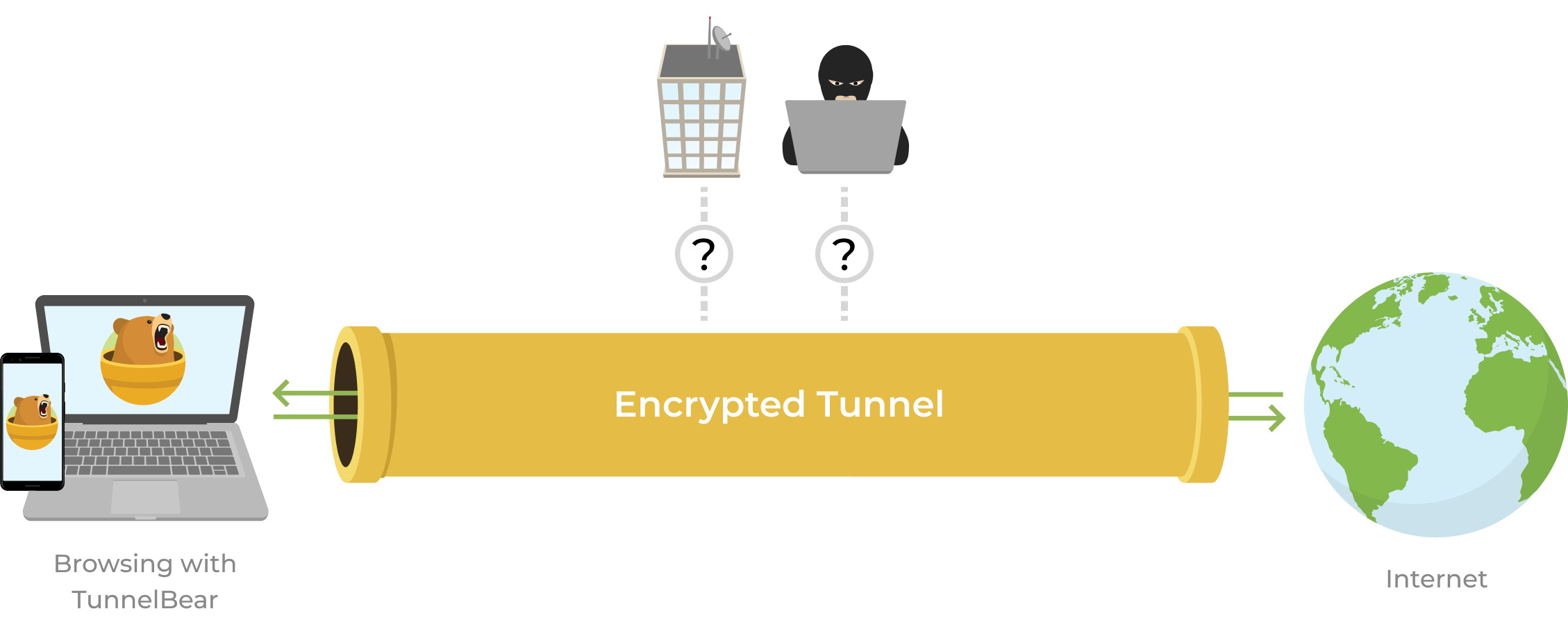
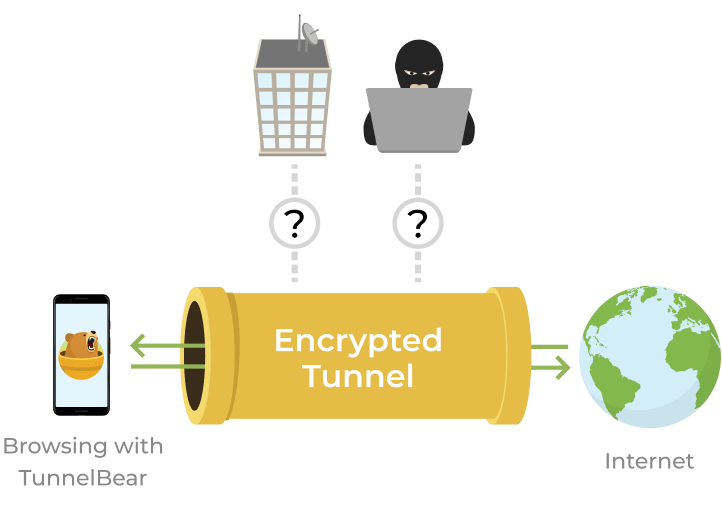
What does a VPN client do exactly?
To use VPN software, you need something called a VPN client. "Client" is really just another term for app, but the difference is that clients act as a gateway between your device and the service you're trying to connect to. Clients aren't a standalone app.
Your device connects to the VPN server through the VPN client. Once you're connected, the client gives you access to the VPN service.
VPN aren't the only software that use clients. Some well-known examples of clients are online games like Fortnite or the Adobe Creative Suite.
How do I install a VPN?

Download the app
TunnelBear apps are available for PC, Mac, iPhone and Android.

Create an account
Use your email and create a password.

Connect
Tap the button to connect to the VPN.
How do I use my VPN once it has been set up?
Once your VPN has been set up, just pick a country and turn it on. The VPN runs in the background as you browse. The most noticeable difference is that you should have access to websites you didn't have access to before.
Most VPN providers offer servers in different countries. This is how people regularly bypass censorship and unblock websites. If you're trying to access something that's blocked in your country, connecting to a server in another country should give you access.
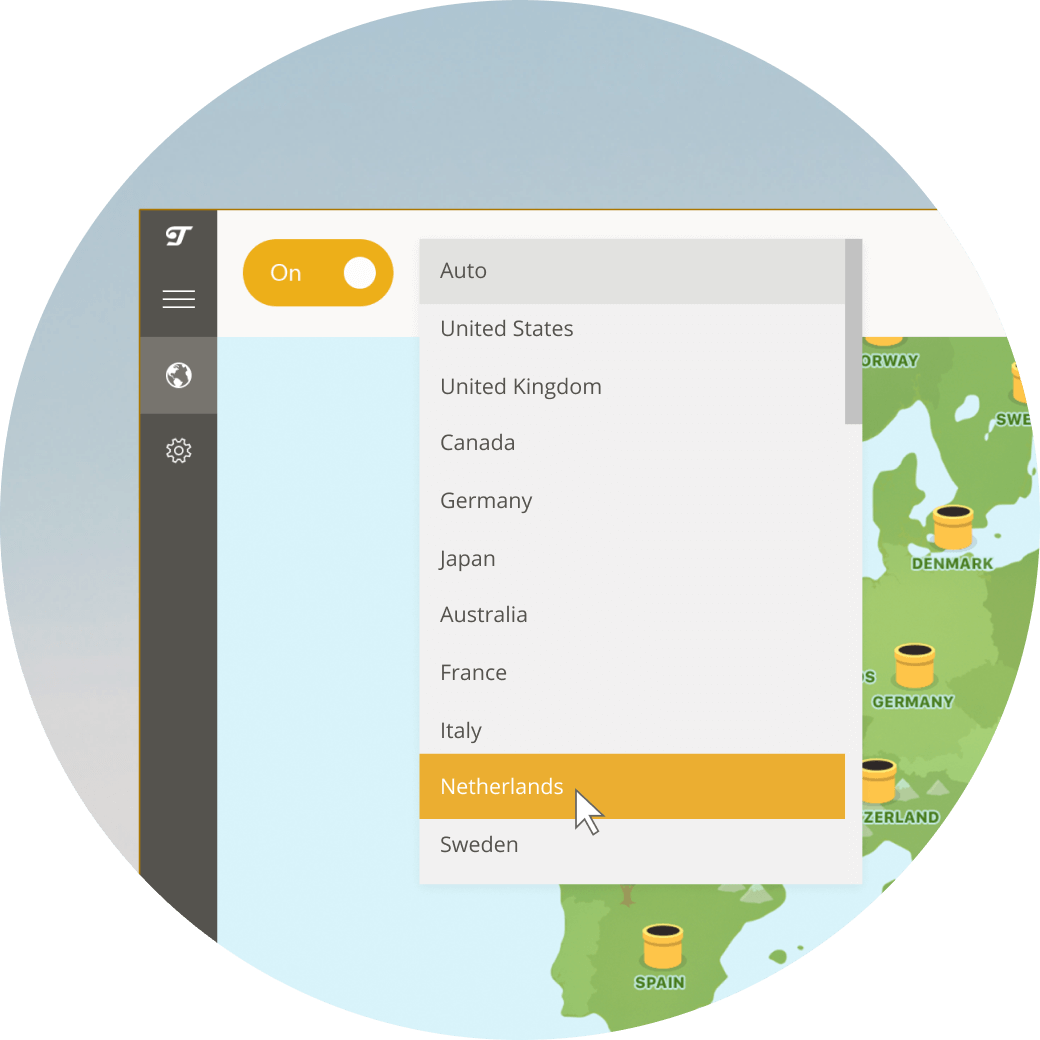
Choose a country and switch TunnelBear on, that's it!
VPN FAQ
Why TunnelBear is the right VPN solution for you
TunnelBear works quietly in the background to protect all of your devices. With apps for phones, laptops, desktops and browser extensions, you can secure all of your data, no matter what device you're on, or where you are.
Using TunnelBear is easy. Once you've installed TunnelBear, you just pick a country and turn it on. All of the complicated work is done for you.
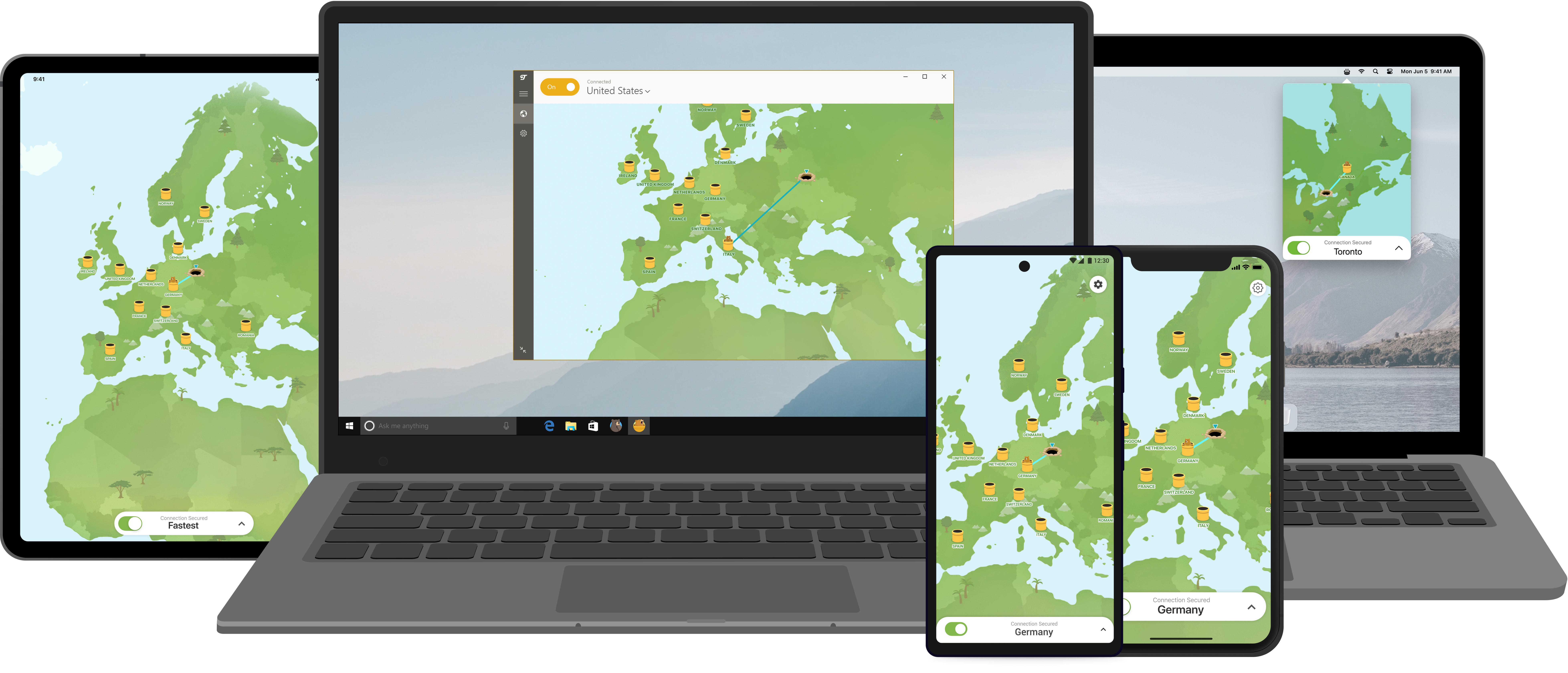
Get TunnelBear on your iPhone, iPad, Android Phone or Tablet, Mac or PC.
Flexible pricing lets you decide whether you would like to be billed monthly or annually (there's a discount for annual memberships).
TunnelBear does not, and will never, log your usage or connection information. Privacy is a Universal Human Right that we respect and fight for. Our Privacy Policy outlines our stance on privacy and customer data.




